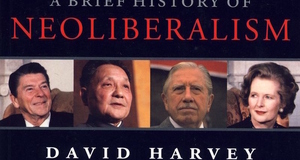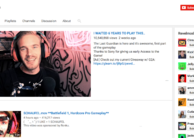|
Media Discourse During the Financial Crisis: An Inquiry into the Nature of the Contemporary "Fourth Estate"
Our study of media discourse during the financial crisis has clearly demonstrated press support for Neoliberalism, which reasserted its hegemony at the expense of other discursive ideas which were suppressed, silencing a persuasive process designed to affect change in society. This study will finally examine the proprietors of our publications under analysis, to ascertain whose interests a modern Fourth Estate represents. It is argued that due to the nature of ownership and revenue streams, the influence of shareholders, finance and advertising; our watchdog has become a product of the free-market, and will suppress criticism and constructive discourse of our internalised norm, Neoliberalism, as it possesses a vested interest in its perpetuation.
Although our publications under analysis have different business models, when closely analysed we find they are subject to different degrees of similar market forces. The Guardian Newspaper is part of the Guardian Media Group (GMG), owned by a single shareholder, the Scott Trust. The entire organisation’s business model is designed to protect the editorial independence of its flagship enterprise the Guardian. As media economics specialist Robert Picard highlights these not-for-profit organisations, although not under direct pressure from financial markets, experience financial pressures like any other business. Like any other enterprise operating in a free-market economy its survival depends on revenue streams.
The Guardian Media Group secures funding through advertising, publication sales, GMG Radio (commercial radio stations), GMG Property Services, Trader Media Group (a range of classified advertising publications), and Emap (a business-to-business media brand service). These business interests, involvement in commercial media, advertising and the property market, demonstrate the extent of commercial interests and level of interaction with the free market economy that even a not for profit media organisation must engage in for its survival. Even a benevolent organisation such as the GMG designed to insulate the Guardian from outside influence is still vulnerable to market forces. When scrutinised more carefully, these business interests could compromise, even slightly, its objectivity. These commercial interests may shed some light on our findings, offering even a tentative explanation of the Guardian’s reticence to publicly sanction and promote new norms which challenge neoliberalism and may have harmed its business interests.
News Corporation, the owner of our other two publications, operates on a different business model. Effectively a publically traded company, where ownership is sold on the stock market and divided among shareholders, its founder, Rupert Murdoch, owns a controlling stake. This gives us an interesting mixture of private ownership where an individual can use the organisation as a platform to voice their personal views (an accusation routinely levelled at Murdoch by communications scholars like David McKnight). As a publically traded company it is also influenced by shareholders, the majority of whom are institutional investors interested in maximising returns on their investment. Like all media groups, News Corporation’s main source of revenue is advertising which in 2011 accounted for almost double that of the corporation’s circulations and subscriptions at $4.945 billon. It is one of the biggest media conglomerates in the world, and considered by many experts, due to its asset spread throughout multiple markets, to be the only genuine global media conglomerate.
It’s publications under analysis offered clear support for the Neoliberal Frame, although was expected of the tabloid, the Sun, The Times also rallied behind the ideology every time it seemed to be challenged by an emerging norm. News Corporation’s publications appeared throughout our study to ensure that the internalised norm maintained its dominance through consistent public sanctioning, and as with the Guardian, through a mobilisation of bias where discussion of the economy, of our crucial mechanism of persuasive change, was gradually muted throughout the year. It is posited in this study that the discursive process and criticism of inconvenient norms was silenced through a combination of a mobilisation of bias and normative hegemony: one group exercising power over another. This study interprets the group in possession of power as those who benefit most from the public sanctioning and mobilisation of bias: the media’s diverse range of ownership and revenue streams, society’s commercial interests, which have a vested interest in maintaining neoliberalism as the dominant political economic ideology.
News Corporation, like the majority of media conglomerates, is a publically traded company, it is effectively owned by investors whose sole concern is the growth of the business and maximising returns on their investment. These owners have no interest in media publications upholding the democratic ideals of the fourth estate, they do not represent the people but their own business interests. Since the inception of our internalised norm in the 1980s and the de-regulation of financial markets, they have witnessed unprecedented growth and returns. These investors have a vested interest in the internalisation of a political economic culture that facilitates their thirst for perpetual growth and profit maximisation. Although owners like shareholders may be naturally inclined to support our internalised norm, it is difficult to ascertain how individual investors’ alleged political conservatism could be transferred into frame sponsorship, affecting our findings and the democratic process so dramatically.
Institutional investors like banks and equity firms provide the majority of capital to the global media market. The extent of their capital support has led many academics to voice concern over the level of influence these groups wield over media organisations. Such influence is evidenced by News Corporation whose second largest shareholder after the Murdoch family is Southeastern Asset Management, Inc. From the late 1990s onwards financial markets have wielded more power over the media than in any period before. Robert Picard tells us that in 1999 over 50% of all venture capital in the USA was invested in the media and communications sector.
This level of investment has transformed the boardrooms of our fourth estate where representatives of these firms now sit as directors monitoring their investment, marking a big departure from the early 1990s when government representatives possessed executive positions, and for us, illustrates an organisational shift where our watchdog now represents the interests of capital as opposed the public good. Somewhat ironically, private equity investment in media markets also appears to increase during periods where there is excess capital in the economy,periods that usually precede financial crashes.
Such an intimate relationship with financial markets demonstrates a degree of cognitive capture of the fourth estate and illustrates how deeply intertwined both industries are to our internalised norm which has facilitated unparalleled growth in both sectors over the last three decades. The intimacy of this relationship is reflected in our findings where publications influenced by such investors rally behind our internalised norm attempting to curb any change or reform to a failing financial system. This exercise in normative hegemony is executed through the media sanctioning norms which are beneficial to commercial aspects of society. What makes our fourth estate such a lucrative investment for owners is this commercial potential. Advertisers are another group who today exercise a large degree of power over our fourth estate.
As our brief analysis of the Guardian Media Group has illustrated, the contemporary fourth estate has to compete as an effect business to survive in the competitive climate created by neoliberalism. Due to this new environment created by our internalised norm, Robert Picard tells us newspapers’ primary concern as a business is to function, “as an advertising delivery system” with contemporary publishers being “completely dependent” on their revenue. This dependency is not restricted to newspapers, with almost half of News Corporations revenue coming from advertisements the entire global media industry can be seen to be built upon commercial foundations, effectively, a business model where audience attention is sold to advertisers.
These commercial interests have become the primary audience, interest and concern of our watchdog. Robert McChesney comments this degree of commercial influence affects content by introducing “a layer of commercial vetting,” and creates a class biased content as advertisers are interested in more affluent sections of society who possess more purchasing power. This vetting results in content designed to appeal to as broad a range of audience as possible, where unorthodox stories, issues and ideas that may create a financial risk are suppressed by widely accepted norms; and where coverage is limited to “safe” issues that restrict the range of ideas and opinions voiced. Such influences, evidenced in our findings, represent a clear mobilisation of bias where unpalatable stories, like a failing economy, are systematically removed from the discourse.
These are the commercial interests, unleashed by market forces which now define our fourth estate. From such an ontological approach, and through our study, we can see how the fourth estate cannot effectively provide a platform for rational critical debate. As our discursive study highlighted: representing commerce, as opposed society, our fourth estate systematically suppressed criticism of neoliberalism, a norm which enhances its business potential. The Normative Hegemony exercised by our watchdog ensured only safe issues were discussed and norms beneficial to commercial interests sanctioned, whilst challenging norms which questioned such orthodoxy were suppressed.
This commercial dependency of the fourth estate has tightened its bond to the free market. Economists have found a correlation between levels of advertising and economic performance, establishing a clear link between growth in Gross Domestic Product and advertising expenditure;meaning media organisations, like both our subjects, have a vested interest in a booming economy. The Principle of Relative Consistency (PRC) posited by Maxwell McCombs, states media income, based on consumers and advertisers, is determined by the general health of the economy. The fourth estate’s roots have become so deeply embedded in the free-market, in our internalised norm, that its behaviour can be interpreted as being dictated by market forces. These market forces encourage what Robert Picard calls, “self-interest behaviour aimed at exploiting market potential.” The interest of commerce has superseded that of the public, the public sanctioning and domination of neoliberalism evidenced by our study, reflects the normative hegemony of these commercial interests sanctioning norms beneficial to their concerns at the expense of others.
Just like any other business the fourth estate is subjected to a range of market forces, which left unchecked, has distorted its nature, adversely affecting the public sphere by representing commerce instead of the public good. Given its critical role in the discursive process this distorted estate is using its power to advance its own commercial interests, exercising its Normative Hegemony to sanction beneficial norms like neoliberalism, whilst silencing others.
The results of our analysis of media discourse need not be interpreted as some conspiracy by evil executives abusing their power. The normative hegemony and mobilisation of bias identified by this study can also be viewed in raw economic terms as an externality. This distortion of the role of the fourth estate, producing tendentious content, acting as a watchdog for business interests as opposed society, can be interpreted as yet another unintended impact unregulated market forces are having on society. These externalities, a product of neoliberal ontology, are arresting the discursive process which propels societal change, intoxicating the public sphere and severely restricting the democratic process.Continued on Next Page »
Altheide, David, “Media Hegemony: A Failure of Perspective” (Public Opinion Quarterly, Volume 48, 1984).
Arrow, Kenneth, “Political and Economic Evaluation of Social Effects and Externalities,” in, Margolis, Julius ed, “The Analysis of Public Output” (UMI, 1970).
Bachrach, Peter & Baratz, Morton, “Two Faces of Power” (The American Political Science Review, Volume 56, Issue 4, December 1962).
Bishop, John H & Bishop, Michael M, “An Economic Theory of Academic Engagement Norms: The Struggle for Popularity and Normative Hegemony in Secondary Schools” (CAHRS Working Paper Series, 2007).
Calhoun, Craig, “Habermas and the Public Sphere” (Massachusetts: MIT Press, 1992).
Carragee, Kevin M & Roefs, Wim, “The Neglect of Power in Recent Framing Research,” (Journal of Communication, Issue 54, June 2004).
Chang, Byeng-Hee & Chan-Olmsted, “Relative Constancy of Advertising Spending: A Cross-National Examination of Advertising Expenditures and their Determinants.” (The International Journal for Communication Studies, Volume 67, Issue 4, June 2005).
Declare, John, in Lauw, Eric, “The Media and Political Process” (London: Sage, 2010).
Editorial, “Banking Bail-Out: Bonfire of the Certainties” (The Guardian, 14/10/08, accessed 04/06/14 on LexisNexis database).
Editorial, “Has Capitalism Failed?,” (The Times 14/10/08, accessed 04/06/14, on LexisNexis database).
Editorial, “Liberal Democrats: The Lure of False Friends” (The Guardian, 21/09/09, accessed 04/06/14 on LexisNexis database).
Editorial, “One Week and the World: UN and G20 Meetings” (The Guardian, 21/09/09, accessed 04/06/14 on LexisNexis database).
Elliot, Larry, “Brown won’t save our jobs. But he may save his own: The G20 deal still leaves fundamental problems, despite the PM’s upbeat view – yet any recovery could swing an election” (The Guardian, 03/04/09, accessed 04/06/14 on LexisNexis database).
Entman, Robert, “Framing: Toward Clarification of a Fractured Paradigm” (Journal of Communication, Volume 43, Issue 4, 1993).
Finnemore, Martha & Sikkink Kathryn, “International Norm Dynamics and Political Change” (International Organisation, Volume 52, Number 4, International Organisation at Fifty: Exploration and Contestation in the Study of World Politics, Autumn, 1998).
Flew, Terry and Gilmour, Callum, “A Tale of Two Synergies: An Institutional Analysis of the Expansionary Strategies of News Corporation and AOL – Time Warner” (Presentation Paper, Managing Communication for Diversity, Australia and New Zealand Communications Association Conference, Brisbane, 9-11 July, 2003).
Freedland, Jonathan, “Our leaders are impotent to tame the beast: this crisis is one of democracy: Politicians’ limitations have been laid bare during these tumultuous weeks. If ever they can assert strength, it is now” (The Guardian, 08/10/08, accessed 04/06/14 on LexisNexis database).
Guardian Media Group, “Securing the long-term future of the Guardian,” (Annual Reports and Accounts 2009, accessed on 22/07/2014).
Guardian Media Group, “The Scott Trust is a Unique form of Media Ownership in the UK,” The Scott Trust, (http://www.gmgplc.co.uk/the-scott-trust/, accessed 17/07/14), p.1.
Habermas, Jürgen, “The Structural Transformation of the Public Sphere: An inquiry into a Category of Bourgeois Society” (Massachusetts: MIT Press, 1989).
Halsall, Robert, “Signs of Crisis and Recovery: Geographical Imaginaries in Press Coverage of the Financial Crisis in the UK and German Press 2008-2009” (Culture and Organisation, Volume 19, Issue 5, October 2013).
Hartz, Ronald, “Reclaiming the Truth of the Market in Times of Crisis: Course, Transformation and Strategies of a Liberal Discourse in Germany” (Culture and Organisation, Volume 18, Issue 2, March 2012).
Herman, Edward, & Chomsky, Noam, “Manufacturing Consent: The Political Economy of the Mass Media” (New York: Random House, 1988).
Jenkins, Simon, “The end of capitalism? No, just another burst bubble: Those drooling over the free-markets collapse are wrong: This passing crisis is down to lax regulation and craven ministers.”(The Guardian 15/10/08, accessed 04/06/14 on LexisNexis database).
Lapid, Yosef, “The Third Debate: On the Prospects of International Theory in a Post-Positivist Era,” (International Studies Quarterly, Volume 33, Number 3, Sept 1993).
Lauw, Eric, “The Media and Political Process” (London: Sage, 2010).
Leader’s Statement, “The Pittsburgh Summit,” September 24-25 2009, (https://www.g20.org/sites/default/files/g20_resources/library/Pittsburgh_Declaration_0.pdf, accessed 19/07/2014).
McChesney, Robert, “Global Media, Neoliberalism and Imperialism” (Monthly Review, Volume 52, Issue 10, March 2001).
McChesney, Robert, “Journalism, Democracy,…and Class Struggle” (Monthly Review, Volume 52, Number 6, 2000).
McChesney, Robert, “The Political Economy of Media: Enduring Issues, Emerging Dilemmas” (New York: Monthly Review Press, 2008).
McNair, Brian, “An Introduction to Political Communication” (London: Routledge, 2011).
McKnight, David, “Rupert Murdoch’s News Corporation: A Media Institution with A Mission” (Historical Journal of Film, Radio and Television, Volume 30, Issue 3).
Monbiot, George, “This stock collapse is pretty when compared to the nature crunch: The financial crisis at least affords us an opportunity to now rethink our catastrophic ecological trajectory,” (The Guardian, 14/10/08, accessed on 04/06/14 on LexisNexis database).
Mudge, Stephanie Lee, “What is neo-liberalism?” (Socio-Economic review, Volume 6, Issue 4, August 2008).
National Readership Survey, “Newspapers,” March 2013, (Monthly Circulation), (National Readership Survey, http://www.nrs.co.uk/downloads/padd-files/pdf/padd-apr12_mar13-newspapers.pdf, accessed 31/07/14).
News Corporation, “Annual Report,” (http://investors.newscorp.com/secfiling.cfm?filingID=1193125-13-373501&CIK=1564708 , accessed 07/07/14).
Neumann, Russel, Just, Marion & Crigler, Ann, “Common Knowledge: News and the Construction of Political Meaning” (Chicago: The University of Chicago Press, 1992).
Orwell, George, Appendix I, Orwell’s proposed preface to Animal Farm, “THE FREEDOM OF THE PRESS,” in, “Animal Farm: A Fairy Story,” (New York: Harcourt Brace, 1995), pp. 207-208.
Peck, J, Theodore, N & Brenner, N, “Postneoliberalism and its Malcontents” (Antipode, Volume 41, Number 51, 2009).
Picard, Robert & van Weezel Aldo, “Capital and Control: Consequences of Different Forms of Newspaper Ownership,” (The International Journal on Media Management, Volume 10, Issue 22, 2008).
Picard, Robert, “Commercialism and Newspaper Quality” (Newspaper Research Journal, Volume 25, Number 1, winter, 2004).
Picard, Robert, “Shifts in Newspaper Advertising Expenditures and their Implications for the Future of Newspapers” (Journalism Studies, Volume 9, Issue 5, 2008).
Rojecki, Andrew, “Rhetorical Alchemy: American Exceptionalism and the War on Terror” (Political Communication, Volume 25, Issue 1, 2008).
Stiglitz, Joseph, “The End of Neoliberalism?” (Project Syndicate, 2008, http://www.project-syndicate.org/commentary/the-end-of-neo-liberalism- accessed on 20/06/14).
Widmaier, Wesley, Blyth and Seabroke, “Symposium of the Social: Construction of Wars and Crises as Openings for Change: Exogenous Shocks or Endogenous Constructions? The Meanings of Wars and Crises” (International Studies Quarterly Volume 51, Number 4, December 2007).
Winseck, Dwayne, “The State of Media Ownership and Media Markets: Competition or Concentration and Why Should We Care?” (Sociology Compass, Volume 2, Issue 1, January 2008).
Data Sample
492 Newspaper Articles. All articles accessed from LexisNexis database 04/06/14
Week 1: 08/10/2008 – 15/10/2008
- 176 Editorial & Opinion Articles; 76 Frames
- The Guardian: 73 Articles; 38 Frames
- The Times: 76 Articles; 25 Frames
- The Sun: 27 Articles; 13 Frames
Week 2: 30/03/2009 – 06/04/2009
- 146 Editorial & Opinion Articles; 30 Frames
- The Guardian: 68 Articles; 13 Frames
- The Times: 54 Articles; 12 Frames
- The Sun: 24 Articles; 5 Frames
Week 3: 21/09/2009 – 28/09/2009
- 170 Editorials & Opinion Articles; 10 Frames
- The Guardian: 82 Articles; 3 Frames
- The Times: 57 Articles; 7 Frames
- The Sun: 31 Articles; 0 Frames
Endnotes
- Orwell, George, Appendix I, Orwell’s proposed preface to Animal Farm, “THE FREEDOM OF THE PRESS,” in, “Animal Farm: A Fairy Story,” (New York: Harcourt Brace, 1995), pp. 207-208.
- Declare, John, in Lauw, Eric, “The Media and Political Process” (London: Sage, 2010). p.49
- McNair, Brian, “An Introduction to Political Communication” (London: Routledge, 2011). pp.18-20.
- Lauw, Eric, “The Media and Political Process” (London: Sage, 2010). p. 48.
- Ibid.
- McChesney, Robert, “Global Media, Neoliberalism and Imperialism” (Monthly Review, Volume 52, Issue 10, March 2001), p.2.
- Winseck, Dwayne, “The State of Media Ownership and Media Markets: Competition or Concentration and Why Should We Care?” (Sociology Compass, Volume 2, Issue 1, January 2008), p.37.
- McChesney, Robert, “Global Media, Neoliberalism and Imperialism” (Monthly Review, Volume 52, Issue 10, March 2001), p.12.
- McChesney, Robert, “Journalism, Democracy,…and Class Struggle” (Monthly Review, Volume 52, Number 6, 2000), p.3.
- Lapid, Yosef, “The Third Debate: On the Prospects of International Theory in a Post-Positivist Era,” (International Studies Quarterly, Volume 33, Number 3, Sept 1993), p.240.
- Hartz, Ronald, “Reclaiming the Truth of the Market in Times of Crisis: Course, Transformation and Strategies of a Liberal Discourse in Germany” (Culture and Organisation, Volume 18, Issue 2, March 2012), p.139.
- Halsall, Robert, “Signs of Crisis and Recovery: Geographical Imaginaries in Press Coverage of the Financial Crisis in the UK and German Press 2008-2009” (Culture and Organisation, Volume 19, Issue 5, October 2013), p.377.
- Peck, J, Theodore, N & Brenner, N, “Postneoliberalism and its Malcontents” (Antipode, Volume 41, Number 51, 2009), pp. 99-100.
- Ibid. p.95.
- Ibid. p.100.
- Halsall, Robert, “Signs of Crisis and Recovery: Geographical Imaginaries in Press Coverage of the Financial Crisis in the UK and German Press 2008-2009” (Culture and Organisation, Volume 19, Issue 5, October 2013), p.384.
- Freedland, Jonathan, “Our leaders are impotent to tame the beast: this crisis is one of democracy: Politicians’ limitations have been laid bare during these tumultuous weeks. If ever they can assert strength, it is now” (The Guardian, 08/10/08, accessed 04/06/14 on LexisNexis database), p.29.
- Editorial, “Banking Bail-Out: Bonfire of the Certainties” (The Guardian, 14/10/08, accessed 04/06/14 on LexisNexis database), p.34.
- Elliot, Larry, “Brown won’t save our jobs. But he may save his own: The G20 deal still leaves fundamental problems, despite the PM’s upbeat view – yet any recovery could swing an election” (The Guardian, 03/04/09, accessed 04/06/14 on LexisNexis database), p.39.
- Editorial, “One Week and the World: UN and G20 Meetings” (The Guardian, 21/09/09, accessed 04/06/14 on LexisNexis database), p.32.
- Editorial, “Liberal Democrats: The Lure of False Friends” (The Guardian, 21/09/09, accessed 04/06/14 on LexisNexis database), p.32.
- National Readership Survey, “Newspapers,” March 2013, (Monthly Circulation), The Sun: 16,986,000; The Guardian 12,459,000; The Times 5,402,000. (National Readership Survey, http://www.nrs.co.uk/downloads/padd-files/pdf/padd-apr12_mar13-newspapers.pdf, accessed 31/07/14), p.1.
- Rojecki, Andrew, “Rhetorical Alchemy: American Exceptionalism and the War on Terror” (Political Communication, Volume 25, Issue 1, 2008), p.73.
- “The Scott Trust,” (Guardian Media Group website, http://www.gmgplc.co.uk/the-scott-trust/ accessed 07/07/14), p.1.
- Ibid.
- Picard, Robert & van Weezel Aldo, “Capital and Control: Consequences of Different Forms of Newspaper Ownership,” (The International Journal on Media Management, Volume 10, Issue 22, 2008), pp.23-27.
- News Corporation, “Annual Report,” (http://investors.newscorp.com/secfiling.cfm?filingID=1193125-13-373501&CIK=1564708 , accessed 07/07/14), p.165.
- National Readership Survey, “Newspapers,” March 2013, Monthly Circulation, (National Readership Survey, http://www.nrs.co.uk/downloads/padd-files/pdf/padd-apr12_mar13-newspapers.pdf, accessed 31/07/14), p.1.
- Entman, Robert, “Framing: Toward Clarification of a Fractured Paradigm” (Journal of Communication, Volume 43, Issue 4, 1993), p.51.
- Ibid. p.52.
- Ibid. p.57.
- Hartz, Ronald, “Reclaiming the Truth of the Market in Times of Crisis: Course, Transformation and Strategies of a Liberal Discourse in Germany” (Culture and Organisation, Volume 18, Issue 2, March 2012), pp.139-152.
- Halsall, Robert, “Signs of Crisis and Recovery: Geographical Imaginaries in Press Coverage of the Financial Crisis in the UK and German Press 2008-2009” (Culture and Organisation, Volume 19, Issue 5, October 2013), pp.337-393.
- Peck, J, Theodore, N & Brenner, N, “Postneoliberalism and its Malcontents” (Antipode, Volume 41, Number 51, 2009), p.95.
- Stiglitz, Joseph, “The End of Neoliberalism?” (Project Syndicate, 2008, http://www.project-syndicate.org/commentary/the-end-of-neo-liberalism- accessed on 20/06/14), p.1.
- Peck, J, Theodore, N & Brenner, N, “Postneoliberalism and its Malcontents” (Antipode, Volume 41, Number 51, 2009), pp.96-106.
- Mudge, Stephanie Lee, “What is neo-liberalism?” (Socio-Economic review, Volume 6, Issue 4, August 2008), p.704.
- Habermas, Jurgen, “The Structural Transformation of the Public Sphere: An inquiry into a Category of Bourgeois Society” (MIT Press: Massachusetts, 1989), pp.2-27.
- Ibid. p.60.
- Calhoun, Craig, “Habermas and the Public Sphere” (MIT Press: Massachusetts, 1992), pp.23-28.
- Finnemore, Martha & Sikkink Kathryn, “International Norm Dynamics and Political Change” (International Organisation, Volume 52, Number 4, International Organisation at Fifty: Exploration and Contestation in the Study of World Politics, Autumn, 1998), p.888.
- Ibid. p.891.
- Ibid. p.904.
- Ibid.
- Ibid. p.906.
- Mudge, Stephanie Lee, “What is neo-liberalism?” (Socio-Economic review, Volume 6, Issue 4, August 2008), p.705.
- Bishop, John H & Bishop, Michael M, “An Economic Theory of Academic Engagement Norms: The Struggle for Popularity and Normative Hegemony in Secondary Schools” (CAHRS Working Paper Series, 2007), p.4.
- Ibid.
- Ibid. p.5.
- Ibid.p.4.
- Bachrach, Peter & Baratz, Morton S, “Two Faces of Power” (The American Political Science Review, Volume 56, Issue 4, December 1962), p.949.
- Ibid. p.948.
- Orwell, George, Appendix I, Orwell’s proposed preface to Animal Farm, “THE FREEDOM OF THE PRESS,” in, “Animal Farm: A Fairy Story,” (New York: Harcourt Brace, 1995), pp. 207-208.
- Bachrach, Peter & Baratz, Morton S, “Two Faces of Power” (The American Political Science Review, Volume 56, Issue 4, December 1962), p.952.
- Widmaier, Wesley, Blyth and Seabroke, “Symposium of the Social: Construction of Wars and Crises as Openings for Change: Exogenous Shocks or Endogenous Constructions? The Meanings of Wars and Crises” (International Studies Quarterly Volume 51, Number 4, December 2007), pp.748-753.
- Ibid. p749.
- Ibid.
- Ibid. p.752.
- Rojecki, Andrew, “Rhetorical Alchemy: American Exceptionalism and the War on Terror” (Political Communication, Volume 25, Issue 1, 2008), p.73.
- Finnemore, Martha & Sikkink Kathryn, “International Norm Dynamics and Political Change” (International Organisation, Volume 52, Number 4, International Organisation at Fifty: Exploration and Contestation in the Study of World Politics, Autumn, 1998), p.897.
- Finnemore, Martha & Sikkink Kathryn, “International Norm Dynamics and Political Change” (International Organisation, Volume 52, Number 4, International Organisation at Fifty: Exploration and Contestation in the Study of World Politics, Autumn, 1998), p.896.
- Ibid. p.897.
- Ibid.
- Ibid. p.895
- Ibid. p.
- Entman, Robert, “Framing: Toward Clarification of a Fractured Paradigm” (Journal of Communication, Volume 43, Issue 4, 1993), p. 52.
- Neumann, Russel, Just, Marion & Crigler, Ann, “Common Knowledge: News and the Construction of Political Meaning” (Chicago: The University of Chicago Press, 1992), p.60.
- Entman, Robert, “Framing: Toward Clarification of a Fractured Paradigm” (Journal of Communication, Volume 43, Issue 4, 1993), p.53.
- Ibid. p.52.
- Ibid. p.53.
- Ibid. p.54.
- Ibid.
- Ibid.
- Ibid. p.55.
- Rojecki, Andrew, “Rhetorical Alchemy: American Exceptionalism and the War on Terror” (Political Communication, Volume 25, Issue 1, 2008), p.82.
- Ibid. p.55.
- Carragee, Kevin M & Roefs, Wim, “The Neglect of Power in Recent Framing Research,” (Journal of Communication, Issue 54, June 2004), p.214.
- Ibid. p.221.
- Ibid. p.221.
- Ibid. p.222.
- Altheide, David, “Media Hegemony: A Failure of Perspective” (Public Opinion Quarterly, Volume 48, 1984), p.479.
- Carragee, Kevin M & Roefs, Wim, “The Neglect of Power in Recent Framing Research,” (Journal of Communication, Issue 54, June 2004), p.223.
- Rojecki, Andrew, “Rhetorical Alchemy: American Exceptionalism and the War on Terror” (Political Communication, Volume 25, Issue 1, 2008), p. 73.
- Entman, Robert, “Framing: Toward Clarification of a Fractured Paradigm” (Journal of Communication, Volume 43, Issue 4, 1993), pp.51-57.
- Ibid. p.52.
- Ibid.
- Ibid.
- Rojecki, Andrew, “Rhetorical Alchemy: American Exceptionalism and the War on Terror” (Political Communication, Volume 25, Issue 1, 2008), p.73.
- Entman, Robert, “Framing: Toward Clarification of a Fractured Paradigm” (Journal of Communication, Volume 43, Issue 4, 1993), p.53.
- Finnemore, Martha & Sikkink Kathryn, “International Norm Dynamics and Political Change” (International Organisation, Volume 52, Number 4, International Organisation at Fifty: Exploration and Contestation in the Study of World Politics, Autumn, 1998).pp.888-894.
- Peck, J, Theodore, N & Brenner, N, “Postneoliberalism and its Malcontents” (Antipode, Volume 41, Number 51, 2009). P.103.
- Bachrach, Peter & Baratz, Morton, “Two Faces of Power” (The American Political Science Review, Volume 56, Issue 4, December 1962). pp. 952-949.
- Halsall, Robert, “Signs of Crisis and Recovery: Geographical Imaginaries in Press Coverage of the Financial Crisis in the UK and German Press 2008-2009” (Culture and Organisation, Volume 19, Issue 5, October 2013). P392.
- Hartz, Ronald, “Reclaiming the Truth of the Market in Times of Crisis: Course, Transformation and Strategies of a Liberal Discourse in Germany” (Culture and Organisation, Volume 18, Issue 2, March 2012). P.146.
- Entman, Robert, “Framing: Toward Clarification of a Fractured Paradigm” (Journal of Communication, Volume 43, Issue 4, 1993). P.53.
- Widmaier, Wesley, Blyth and Seabroke, “Symposium of the Social: Construction of Wars and Crises as Openings for Change: Exogenous Shocks or Endogenous Constructions? The Meanings of Wars and Crises” (International Studies Quarterly Volume 51, Number 4, December 2007). p.752.
- Rojecki, Andrew, “Rhetorical Alchemy: American Exceptionalism and the War on Terror” (Political Communication, Volume 25, Issue 1, 2008). p.73.
- Finnemore, Martha & Sikkink Kathryn, “International Norm Dynamics and Political Change” (International Organisation, Volume 52, Number 4, International Organisation at Fifty: Exploration and Contestation in the Study of World Politics, Autumn, 1998). p.896.
- Guardian Media Group, “The Scott Trust is a Unique form of Media Ownership in the UK,” The Scott Trust, (http://www.gmgplc.co.uk/the-scott-trust/, accessed 17/07/14), p.1.
- Editorial, “Banking Bail-Out: Bonfire of the Certainties” (The Guardian, 14/10/08, accessed 04/06/14 on LexisNexis database), p.34.
- Hartz, Ronald, “Reclaiming the Truth of the Market in Times of Crisis: Course, Transformation and Strategies of a Liberal Discourse in Germany” (Culture and Organisation, Volume 18, Issue 2, March 2012), p.139.
- Peck, J, Theodore, N & Brenner, N, “Postneoliberalism and its Malcontents” (Antipode, Volume 41, Number 51, 2009), pp. 99-100.
- Widmaier, Wesley, Blyth and Seabroke, “Symposium of the Social: Construction of Wars and Crises as Openings for Change: Exogenous Shocks or Endogenous Constructions? The Meanings of Wars and Crises” (International Studies Quarterly Volume 51, Number 4, December 2007). Pp753-754.
- Editorial, “Has Capitalism Failed?,” (The Times 14/10/08, accessed 04/06/14, on LexisNexis database), p.2.
- Finnemore, Martha & Sikkink Kathryn, “International Norm Dynamics and Political Change” (International Organisation, Volume 52, Number 4, International Organisation at Fifty: Exploration and Contestation in the Study of World Politics, Autumn, 1998), p. 888.
- Monbiot, George, “This stock collapse is pretty when compared to the nature crunch: The financial crisis at least affords us an opportunity to now rethink our catastrophic ecological trajectory,” (The Guardian, 14/10/08, accessed on 04/06/14 on LexisNexis database), p.31.
- Jenkins, Simon, “The end of capitalism? No, just another burst bubble: Those drooling over the free-markets collapse are wrong: This passing crisis is down to lax regulation and craven ministers.”(The Guardian 15/10/08, accessed 04/06/14 on LexisNexis database), p.29.
- Ibid. p.897.
- Ibid. p. 894.
- Ibid. pp.894-895.
- Elliot, Larry, “Brown won’t save our jobs. But he may save his own: The G20 deal still leaves fundamental problems, despite the PM’s upbeat view – yet any recovery could swing an election” (The Guardian, 03/04/09, accessed 04/06/14 on LexisNexis database), p.1.
- Ibid.
- Finnemore, Martha & Sikkink Kathryn, “International Norm Dynamics and Political Change” (International Organisation, Volume 52, Number 4, International Organisation at Fifty: Exploration and Contestation in the Study of World Politics, Autumn, 1998), p. 902.
- Halsall, Robert, “Signs of Crisis and Recovery: Geographical Imaginaries in Press Coverage of the Financial Crisis in the UK and German Press 2008-2009” (Culture and Organisation, Volume 19, Issue 5, October 2013). pp.337-393.
- Leader’s Statement, “The Pittsburgh Summit,” September 24-25 2009, (https://www.g20.org/sites/default/files/g20_resources/library/Pittsburgh_Declaration_0.pdf, accessed 19/07/2014), p2.
- Editorial, “One Week and the World: UN and G20 Meetings” (The Guardian, 21/09/09, accessed 04/06/14 on LexisNexis database). p.32.
- Editorial, “Liberal Democrats: The Lure of False Friends” (The Guardian, 21/09/09, accessed 04/06/14 on LexisNexis database), p.32.
- Rojecki, Andrew, “Rhetorical Alchemy: American Exceptionalism and the War on Terror” (Political Communication, Volume 25, Issue 1, 2008). P.73.
- Ibid, p.82.
- Ibid, pp.73-83.
- Halsall, Robert, “Signs of Crisis and Recovery: Geographical Imaginaries in Press Coverage of the Financial Crisis in the UK and German Press 2008-2009” (Culture and Organisation, Volume 19, Issue 5, October 2013), pp. 377-393.
- Guardian Media Group, “Securing the long-term future of the Guardian,” (Annual Reports and Accounts 2009, accessed on 22/07/2014), p.1.
- Ibid.
- Picard, Robert & Van Weezel Aldo, “Capital and Control: Consequences of Different Forms of Newspaper Ownership,” (The International Journal of Media Management, Volume 10, Issue 22, 2008), p.27.
- Guardian Media Group, “Securing the long-term future of the Guardian,” (Annual Reports and Accounts 2009, accessed on 22/07/2014), p. 2.
- News Corporation, “Annual Report,” (http://investors.newscorp.com/secfiling.cfm?filingID=1193125-13-373501&CIK=1564708 , accessed 07/07/14),p.167.
- McKnight, David, “Rupert Murdoch’s News Corporation: A Media Institution with A Mission” (Historical Journal of Film, Radio and Television, Volume 30, Issue 3), p.304.
- Picard, Robert & Van Weezel Aldo, “Capital and Control: Consequences of Different Forms of Newspaper Ownership,” (The International Journal of Media Management, Volume 10, Issue 22, 2008), pp.25-26.
- News Corporation, “Annual Report,” (http://investors.newscorp.com/secfiling.cfm?filingID=1193125-13-373501&CIK=1564708 , accessed 07/07/14), p.71.
- Flew, Terry and Gilmour, Callum, “A Tale of Two Synergies: An Institutional Analysis of the Expansionary Strategies of News Corporation and AOL – Time Warner” (Presentation Paper, Managing Communication for Diversity, Australia and New Zealand Communications Association Conference, Brisbane, 9-11 July, 2003), p.12.
- Picard, Robert & Van Weezel Aldo, “Capital and Control: Consequences of Different Forms of Newspaper Ownership,” (The International Journal of Media Management, Volume 10, Issue 22, 2008), p.26.
- Ibid.
- News Corporation, “Annual Report,” (http://investors.newscorp.com/secfiling.cfm?filingID=1193125-13-373501&CIK=1564708 , accessed 07/07/14), p.165.
- Winseck, Dwayne, “The State of Media Ownership and Media Markets: Competition or Concentration and Why Should We Care?” (Sociology Compass, Volume 2, Issue 1, January 2008), p.40.
- Ibid.
- Picard, Robert & Van Weezel Aldo, “Capital and Control: Consequences of Different Forms of Newspaper Ownership,” (The International Journal of Media Management, Volume 10, Issue 22, 2008), p.25.
- Picard, Robert, “Shifts in Newspaper Advertising Expenditures and their Implications for the Future of Newspapers” (Journalism Studies, Volume 9, Issue 5, 2008), p.704.
- Picard, Robert, “Commercialism and Newspaper Quality” (Newspaper Research Journal, Volume 25, Number 1, winter, 2004), p.60.
- McChesney, Robert, “The Political Economy of Media: Enduring Issues, Emerging Dilemmas” (New York: Monthly Review Press, 2008), p.421.
- Picard, Robert, “Commercialism and Newspaper Quality” (Newspaper Research Journal, Volume 25, Number 1, Winter, 2004), p.61.
- Picard, Robert, “Shifts in Newspaper Advertising Expenditures and their Implications for the Future of Newspapers” (Journalism Studies, Volume 9, Issue 5, 2008), p.705.
- Chang, Byeng-Hee & Chan-Olmsted, “Relative Constancy of Advertising Spending: A Cross-National Examination of Advertising Expenditures and their Determinants.” (The International Journal for Communication Studies, Volume 67, Issue 4, June 2005), pp.339-340.
- Picard, Robert, “Commercialism and Newspaper Quality” (Newspaper Research Journal, Volume 25, Number 1, Winter, 2004), p.54.
- McChesney, Robert, “The Political Economy of Media: Enduring Issues, Emerging Dilemmas” (New York: Monthly Review Press, 2008), p422.
- Bachrach, Peter & Baratz, Morton, “Two Faces of Power” (The American Political Science Review, Volume 56, Issue 4, December 1962). p.952.
- Habermas, Jurgen, “The Structural Transformation of the Public Sphere: An inquiry into a Category of Bourgeois Society” (MIT Press: Massachusetts, 1989), p21.
Save Citation » (Works with EndNote, ProCite, & Reference Manager)
APA 6th
Docherty, S. (2015). "Media Discourse During the Financial Crisis: An Inquiry into the Nature of the Contemporary 'Fourth Estate'." Inquiries Journal/Student Pulse, 7(06). Retrieved from http://www.inquiriesjournal.com/a?id=1051
MLA
Docherty, Shaun. "Media Discourse During the Financial Crisis: An Inquiry into the Nature of the Contemporary 'Fourth Estate'." Inquiries Journal/Student Pulse 7.06 (2015). <http://www.inquiriesjournal.com/a?id=1051>
Chicago 16th
Docherty, Shaun. 2015. Media Discourse During the Financial Crisis: An Inquiry into the Nature of the Contemporary 'Fourth Estate'. Inquiries Journal/Student Pulse 7 (06), http://www.inquiriesjournal.com/a?id=1051
Harvard
DOCHERTY, S. 2015. Media Discourse During the Financial Crisis: An Inquiry into the Nature of the Contemporary 'Fourth Estate'. Inquiries Journal/Student Pulse [Online], 7. Available: http://www.inquiriesjournal.com/a?id=1051
Suggested Reading from Inquiries Journal
In 2014, Greenpeace launched an attack on a 50-year brand partnership between Danish toy company LEGO and Royal Dutch Shell, an oil and gas corporation. Through the analysis of Greenpeace's campaign and LEGO's responses over a three-month period, this case study examined how Greenpeace influenced LEGO's communications with its consumers... MORE»
Conceiving neoliberalism as a form of constructivism, an ideological project rather than a doctrine prefigured by ‘human nature’, illuminates a promising path towards countering its impoverishing effect on both the citizen subject and the ethos of democracy. This involves a concerted intervention at the level of discourse... MORE»
Michael Thompson, reviewing A Brief History of Neoliberalism by David Harvey, calls it ‘the world according to David Harvey’ (2005). This is an accurate remark: although erring slightly on the side of conspiracy, the book is a breathtaking overview of the ‘neoliberal world’ through Harvey&rsquo... MORE»
Since the financial crisis of 2007, regulators have recognized the necessity for global governance in an increasingly interconnected global economy. Many have praised the extent to which regulators have already minimized... MORE»
Latest in Business & Communications
2021, Vol. 13 No. 09
This research lies at the nexus of political communication theory relating to emotional affect and political processing and the burgeoning field of sentiment analysis. News coverage can affect opinion both through the information it provides and... Read Article »
2021, Vol. 13 No. 06
This research study explores factors that present barriers to reporting workplace incidents and contribute to cultures of non-report. The research purpose was to explore human, workplace/organizational, and external factors identified by industrial... Read Article »
2016, Vol. 8 No. 11
In its beta release, Google Glass was positioned as a groundbreaking technology - a glimpse into a future that has long been promised in science fiction. It was met with media fanfare and consumer interest, despite costing more than most PCs on... Read Article »
2016, Vol. 7 No. 1
Predicting the future of the news industry begins with understanding the history of newspapers and the current news delivery landscape. Because the Internet has brought fundamental shifts to news distribution, successful organizations of the future... Read Article »
2016, Vol. 7 No. 1
Instagram allows users to share a snapshot of their lives with a mass audience in a matter of seconds. This capability and power has not gone unnoticed by celebrities, who are highly aware of the impact their social media accounts have on fans and... Read Article »
2016, Vol. 7 No. 1
Since its development, YouTube, the world's third most popular online destination, has transformed from a video-sharing site into a job opportunity for content creators in both new and mainstream media. Based on content analysis, the study examined... Read Article »
2016, Vol. 7 No. 1
Today, more than 15 million Americans practice yoga, making the ancient Indian discipline synonymous with the Western society's culture of wellness. As a way to market themselves, practitioners and instructors of yoga have utilized Instagram &ndash... Read Article »
|



















